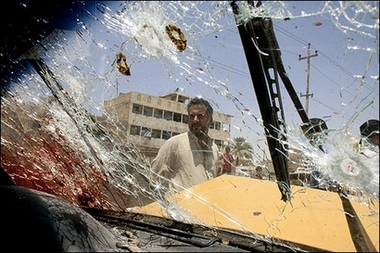Middle East
Bomb kills 22 at Baghdad bus station
(AP)
Updated: 2007-06-29 01:50
 |
Large Medium Small |
 An Iraqi inspects the bullet-riddled windshield of a car at Baghdad's impoverished district of Sadr City. Insurgents killed at least 27 people in bombings and shootings in Iraq on Wednesday, including 10 in a car bomb in a Baghdad Shiite neighbourhood after nightfall, security officials said.[AFP]  |
In addition to the dead, more than 50 people were wounded in the rush-hour blast in the Baiyaa neighborhood, police said on condition of anonymity because they were not authorized to release the information.
A huge fireball incinerated about 40 minibuses as people were lining up to catch rides to work, police and survivors said.
Associated Press Television News video showed the area littered with smoldering vehicle parts and charred bodies - their clothing in tatters. Bystanders, some weeping, gingerly loaded human remains into ambulances and pickup trucks.
No group claimed responsibility for the blast, but suspicion fell on Sunni militants.
Baiyaa is a mixed neighborhood with a Shiite majority, part of a string of neighborhoods just south of the main road to Baghdad International Airport where sectarian tensions have been running high.
U.S. and Iraqi commanders have launched operations in towns and villages around the capital in hopes of stopping the flow of car bombs into Baghdad, where thousands of American troops have been deployed since February to try to restore order.
One American soldier was killed Thursday and another was wounded by a roadside bombing during a combat patrol in eastern Baghdad, the U.S. military said.
To the south, two policemen from separate commands said villagers had reported finding 20 beheaded bodies near the Sunni Muslim village of Um al-Abeed. The village is near the city of Salman Pak, 15 miles southeast of the capital.
Villagers said the victims were all men aged 20 to 40 and that their hands and legs had been bound, the two officers said on condition of anonymity because they were not authorized to release the information.
Another police officer in eastern Baghdad said officials had heard the report and tried to send a force to the area to confirm it. The visit was called off because the area was too dangerous because of clashes between police commandos and extremists.
An official in Prime Minister Nouri al-Maliki's office said he had seen no such report. He also spoke on condition of anonymity because he was not supposed to talk to media.
Maj. Alayne Conway, a U.S. military spokeswoman, said U.S. aircraft spotted what appeared to be five bodies on the east side of the Tigris River north of Salman Pak. American ground troops were sent to investigate but could not find the bodies.
Salman Pak and the surrounding area have been the focus of new U.S. military operations to oust extremists from the Baghdad's outskirts. Salman Pak was once a major headquarters for Saddam Hussein's security services and was long reported to be a training center for non-Iraqi Arab terrorists.
Both Sunni and Shiite extremists operate in the area, long a flashpoint of sectarian tension.
Fears of more sectarian violence rose Thursday when radical Shiite cleric Muqtada al-Sadr vowed to go ahead with a planned march July 5 to the devastated Askariya shrine in Samarra.
Al-Sadr, head of the notorious Mahdi Army militia, said the goal was to unite Sunnis and Shiites against the Americans and Sunni extremists responsible for attacks against civilians.
But the government and Sunni organizations have urged al-Sadr to cancel the march, fearing it will provoke attacks by Sunni insurgents and further enflame sectarian violence.
The Feb. 22, 2006 bombing of the Askariya shrine provoked a wave of Shiite-Sunni reprisal killings that plunged the nation to the brink of all-out sectarian war. A blast June 13 destroyed two minarets that had survived the 2006 explosion.
At least 51 people were killed or found dead across the country Thursday, according to police reports.
They included three people who died when mortar shells slammed into the Shorja market in central Baghdad. At least 14 people were wounded in the market attack, said a policeman on condition of anonymity as he was not authorized to talk to media.
Also Thursday, the British military said three British soldiers were killed in a roadside bomb in southern Iraq.
The bomb exploded near the soldiers' vehicle late Wednesday southeast of Basra, Iraq's second-largest city, the military said in a statement. Another soldier was wounded in the blast and was in stable condition at a military hospital, it said.
Britain has withdrawn hundreds of troops from Iraq, leaving a force of about 5,500 based mainly on the fringes of Basra, 340 miles southeast of Baghdad. The U.S. has about 155,000 troops in Iraq.
Also Thursday, an Iraqi legislator accused the U.S. Embassy of providing shelter to Culture Minister Asad Kamal al-Hashimi, a Sunni under investigation in the 2005 assassination attempt against the lawmaker. His two sons were killed in the attack.
Legislator Mithal al-Alusi said the minister was hiding in the U.S.-controlled Green Zone since an arrest warrant was issued against him this week.
"The embassy is giving shelter to the fugitive minister" and protecting him, al-Alusi told reporters.
The US Embassy said in a statement that it had not "intervened in the situation" and that the case "is for the government of Iraq to resolve in accordance with the rule of law."
"Mithal al-Alusi's accusations are incorrect," Embassy spokesman Philip Reeker wrote in an e-mail to The Associated Press.
Sunni politicians claim that al-Hashimi's arrest warrant is part of a campaign by the Shiite-dominated government to marginalize Sunni political leaders. Sunni leader Adnan al-Dulaimi said Wednesday that he believed the minister's departure from Iraq "will be facilitated."
| 分享按钮 |